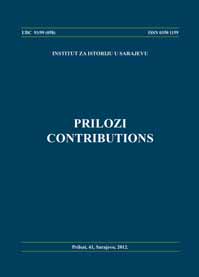Verbalni delikt u Bosni i Hercegovini (1918-1921).
Verbal Delict in Bosnia and Herzegovina (1918-1921)
Author(s): Enes S. OmerovićSubject(s): History
Published by: Institut za istoriju
Summary/Abstract: From its creation the Kingdom of the Serbs, Croats and Slovenes was faced with resistance from a part of its own population. This resistance to the unification, ideas and the actions which followed it, the opposition to the new state and state institutions, bearers of government, the state and social system, was manifested in different ways, and was directed against everything which personified the new state. While in certain parts of the Kingdom of SHS violent forms of resistance prevailed, in the parts which were under the Austro-Hungarian monarchy prior to unification were dominated by non-violent forms of resistance. The most widespread form of individual non-violent resistance and expression of dissatisfaction was the verbal delict, and in Bosnia and Herzegovina, Dalmatia, Croatia and Vojvodina, the verbal delict was more present than in other parts of the country. In Bosnia and Herzegovina, the cases of verbal delict appeared from the very unification and did not lose their intensity in the following period. The verbal delict, in all its variations, was a way for an individual to express his dissatisfaction and resistance towards the state and everything that personified the state. But not all cases of verbal delict carried with themselves the political message since swearwords in the speech of the local population were and remain to be usual buzzwords. Also, by cursing of the King or some other public personality in arguments, the offenders often did not have the intention to offend this personality but rather their adversary in the argument, cursing all which he considered holy – God, faith, family members, and even the King. The structure of verbal delict offenders was varied according to different parameters, and among them were people of different sex (men and women), age groups (adults and children), social status (rich and poor), occupation (peasants, workers, merchants, landowners, journalists, teachers, state officials, parliament representatives, etc.), political convictions (communists, sympathisers of civic political parties, apolitical individuals), religious adherence (Catholics, Orthodox Christians, Muslims and others) and nationality. In the aim to build and preserve its authority, the state made efforts in order to sanction the cases of verbal delicts. However, the legislative activity of the new organs of government and the actions of institutions which were included in the revealing, interrogation and punishing of verbal delicts showed at the same time all the problems in the functioning of repressive apparatus which was in the process of being constructed during the period between 1918 and 1921.
Journal: Prilozi
- Issue Year: 2012
- Issue No: 41
- Page Range: 79-105
- Page Count: 27
- Language: Bosnian

